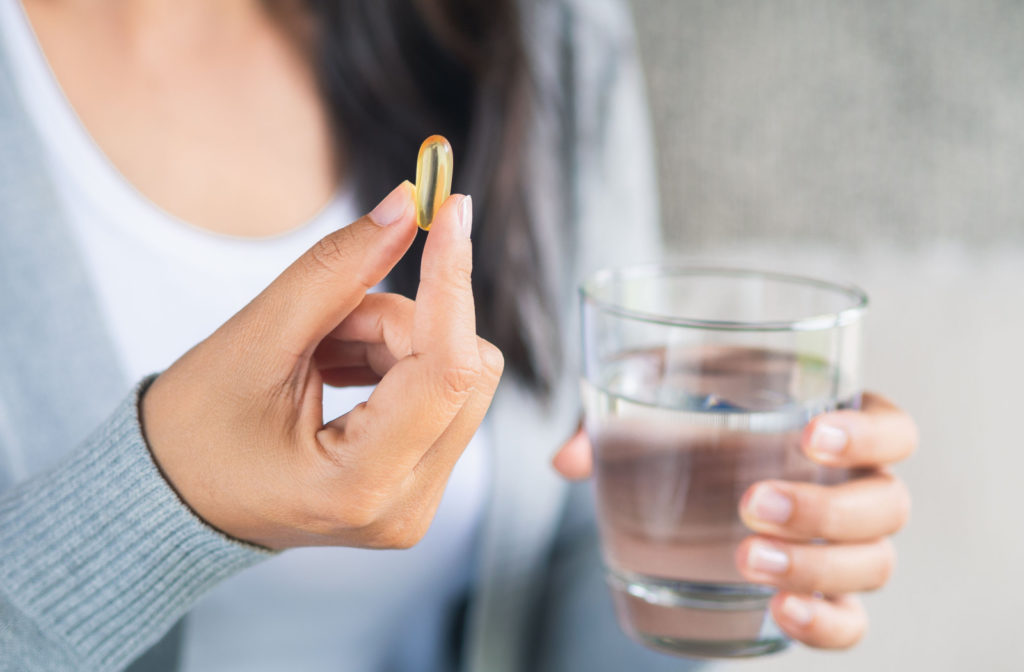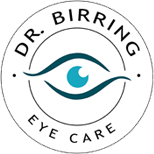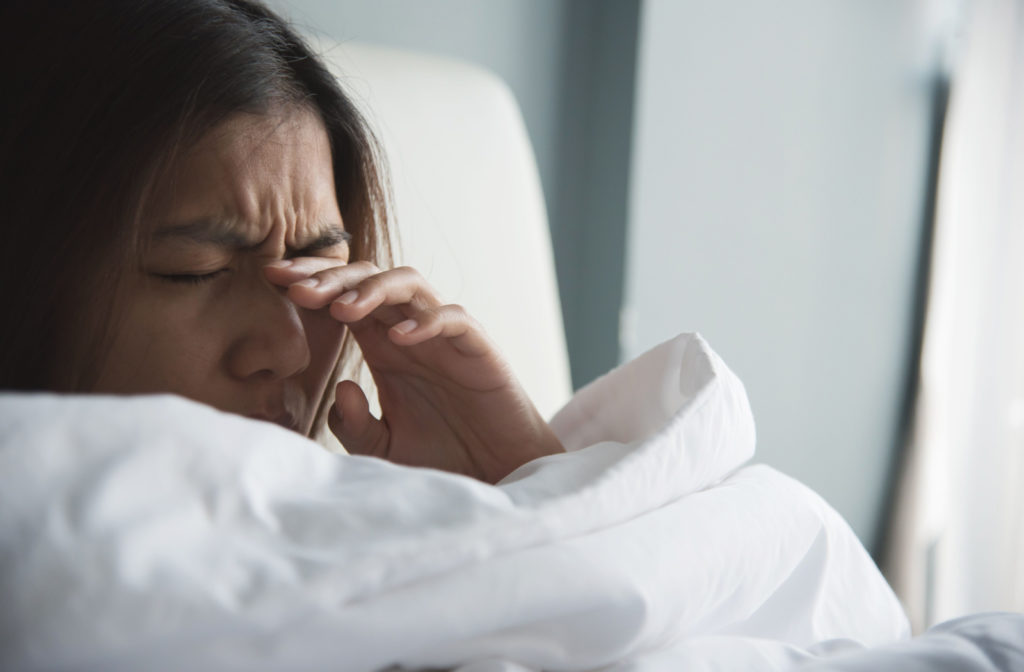There’s nothing like waking up in the morning feeling refreshed and ready for anything. But when you first wake up and notice that burning, gritty feeling in the eyes, it can be an extremely frustrating way to start the day. It’s likely dry eye disease—an extremely common condition. What causes these dry eyes in the morning?
7 reasons why you’re waking up with dry eyes include:
- Environmental factors
- Improper contact lens usage
- Health conditions
- Medication
- Sleeping with your eyes open
- Diet & Hydration
- Recent surgery
Fortunately, you can visit your optometrist for dry eye therapy to find relief!
What Is Dry Eye Disease?
When your eyes are healthy, tears are produced to protect, hydrate, and nourish the eye. They let the eye flush away irritants, dust, and debris. These tears are made of 3 layers:
- The mucus layer, which keeps the tear attached to the eye
- The water layer, which helps make up most of the tear and flush away contaminants
- The oil layer, which seals the tear, keeps the outside surface smooth while preventing it from evaporating too quickly
This last layer, the oil layer, is made in the meibomian glands—tiny little glands located near the base of your eyelashes. Sometimes, these glands can become blocked, stopping the oils from reaching the tears. This causes the tear to evaporate too quickly, leaving the eye vulnerable.
In other situations, the tears themselves aren’t produced quickly enough. This leaves the eye exposed to the air for short periods of time, and it starts to dry out.
In either case, the results are the same: the eye is exposed, vulnerable, and begins to dry out. When this develops, it’s called dry eye disease.
So what causes these problems with the tear film? Why are your eyes dry in the morning?
1: Environmental Factors
One of the most common causes of dry eye disease is environmental factors. When the air is particularly dry, dusty, or smoky, the eyes have to work harder to produce enough tears.
So if you often sleep near an air conditioner, space heater, or a fan, it could be causing your eyes to dry out while you sleep. The outside climate matters as well! Wind, smoke, and more can all affect your eyes. So it can help to:
- Close the windows
- Use a humidifier
- Place any air conditioners or heaters in a way that doesn’t hit your face
Making small environmental changes is an excellent place to start.
2: Improper Contact Usage
If you wear contact lenses, they may just be the culprit—especially if you ever fall asleep wearing them. Improper usage and maintenance play a big part in how comfortable the lenses are. If you commonly wear contacts, it can help to:
- Make sure you regularly store and clean the lenses properly
- Never fall asleep wearing contacts
- Take them out occasionally to give your eyes a break
- Use eye drops to find relief
If you still don’t find relief, try speaking with your optometrist. They may be able to recommend different lenses designed specifically for dry eyes, like scleral lenses or softer silicone hydrogel lenses.
3: Health Conditions
Dry eye disease can also be caused by other health conditions, like:
- Sjogren’s syndrome, where the immune system attacks healthy cells
- Rheumatoid arthritis
- Diabetes
- Thyroid disorders
- Hormonal changes, especially during menopause
These conditions can put additional strain on the immune system and start to affect tear production and quality. If you’ve been diagnosed with any of these conditions, you should visit your healthcare professional to address any underlying health issues that could be affecting your eyes.
4: Medication
It isn’t just health conditions that could be causing those burning feelings. Certain medications can cause a similar response in the body. Common causes include:
- Antihistamines
- Decongestants
- Antidepressants
If you’re taking any of these medications and notice that you’re starting to wake up with dry eyes, speak to your doctor to see if there are any alternative options.
5: Sleeping with Your Eyes Open
Even if you aren’t aware of it, you could be sleeping with your eyes partially open. Not like in the cartoons, where you have a blank stare throughout the night, but simply that your eyelids don’t fully close and seal.
When this happens, it’s called nocturnal lagophthalmos. It leads to the tears evaporating throughout the night, leaving the eye dried out and irritated in the morning. If you think this might be the reason your eyes are dry in the morning, try speaking with an eye care professional.

6: Hydration & Diet
What you eat and what you drink can have a significant effect on your eye health. Your eyes are extremely complex, and they need specific vitamins and nutrients to stay healthy. Make sure that you’re eating a diet rich with:
- Omega-3 fatty acids
- Vitamin A
- Vitamin C
- Vitamin E
- Zinc
- Lutein and Zeaxanthin
Dehydration plays a part as well. Your eyes can’t make tears if you don’t drink enough water!
7: Recent Surgery
If you’ve recently undergone surgery, especially procedures involving the eyes, it’s not uncommon to experience dry eyes during the recovery period. This is often temporary and typically improves with time.
Make sure you’re following your surgeon’s post-operation care instructions so you can heal and recover properly!
How Is Dry Eye Treated?
When you’re trying to find relief from your dry eyes, it all starts with a consultation with your optometrist. Our team at Birring Eyecare can help! We’ll perform a thorough examination of your eyes to find out what’s causing your dry eye disease, then we’ll likely recommend:
- Artificial tears to bring temporary relief
- Omega-3 supplements to encourage a healthy tear film
- Warm compress eye masks to add moisture, relieve pain, and potentially remove oil blockages
- Cynosure® radiofrequency treatment to loosen blockages in the meibomian gland. It also stimulates collagen production in the area!
- At-home lifestyle changes, like regularly cleaning your eyelids to remove bacterial buildup
- Blepharitis, where bacterial buildup on the edge of the eyelid causes inflammation and irritation in the area.
Find Relief from Your Dry Eyes
If you’re tired of waking up with dry, irritated eyes, reach out to our team at Birring Eyecare. We can help diagnose the cause of your dry eyes and help you find relief. You don’t deserve to deal with dry eye disease, so book an appointment with our team and take the first step toward treatment!



